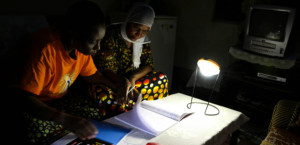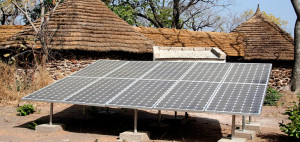The Future is Going Off-Grid
Nov 15th, 2016 | By admin | Category: Energy and Carbon EmissionsBy Suzanne York.
In terms of dirty energy vs. clean, the writing is on the wall.
Despite promises made to the contrary, jobs in the fossil fuel industry are not likely to come back, and even if they did, not for long. The costs of solar and wind are falling well below coal and oil, and more and more cities and countries are committing to clean energy. It does not make good business sense to continue to invest in and rely on dirty fossil fuels.As far as “keep it in the ground” goes, we aren’t there yet, but we are moving, albeit slowly, in that direction. This applies to both developed and developing countries.
African Abundance
Recently The Economist ran an article on the increase in off-grid energy in Africa. Two of three people in Africa lack access to electricity, and nations obviously need citizens to have affordable energy sources for growth and development. It’s not the wave of the future; it’s here now. The Economist writes:
Off-grid solar is spreading at an electrifying pace. An industry that barely existed a few years ago is now thought to be providing power to perhaps 600,000 households in Africa. The pace of growth is accelerating in a continent that, more than any other, is rich in sunshine. Industry executives reckon that over the next year the number of home-power systems on African roofs will grow by 60-100%.
It is anticipated that clean energy will take the same path as phones, where mobile phones helped people bypass landlines. Here technology will enable people to leapfrog from no energy to off-grid renewables. The reasons for transitioning to off-grid energy are many. Briefly, this is what The Economist notes as the three top reasons to go off-grid:
- an 80% fall in the cost of solar panels since 2010;
- the “pay-as-you-go” business model, based on selling electricity as a service rather than selling solar cells;
- the development of devices that use less electricity, such as LED lightbulbs, but also includes phones, radios and TVs.
There are many organizations working on small-scale, off-the-grid energy alternatives. And just as importantly, getting people off kerosene cook stoves and charcoal for cleaner air and less deforestation. One such company is Kenya-based M-KOPA Solar, which installs solar-power home systems for mainly rural and low-income customers. M-KOPA uses a pay-as-you-go system integrated with a mobile money platform. This allows customers to sell solar power on a monthly, daily, weekly or even hourly basis. Kopa means “to borrow” in Swahili.
M-Kopa estimates that 80 percent of its customers live on less than $2 a day. Three-quarters of them rely on small-scale farming as their primary or secondary source of income; the rest run small businesses.
Then there is Solar Sister, which works to “eradicate energy poverty by empowering women with economic opportunity.” They do so via a network of women entrepreneurs who bring solar technology to rural areas. Through a micro-consignment model, Solar Sister entrepreneurs are provided a ‘business in a bag’ – a start-up kit of inventory, training and marketing support to bring clean energy directly to their customer’s doorsteps. What really sets Solar Sister apart is its belief that investing in women is a prerequisite for large-scale adoption of clean energy technologies at a grassroots level.
Earlier this year, an assessment of the impact of the Solar Sisters model concluded that their method improved women’s lives, increased their incomes and made communities safer. One customer said “Solar Sister has been a game changer” for her and her family.
Watch Solar Sister’s video Ripple Rwanda on how their initiative is changing lives:
Clean energy, of course, will not solve all of Africa’s or the world’s problems, but for people who lack electricity, it is a lifesaver. Off-grid energy can bring energy to families desperately needing a path to a better and brighter future.
Suzanne York is Project Director of Transition Earth.


